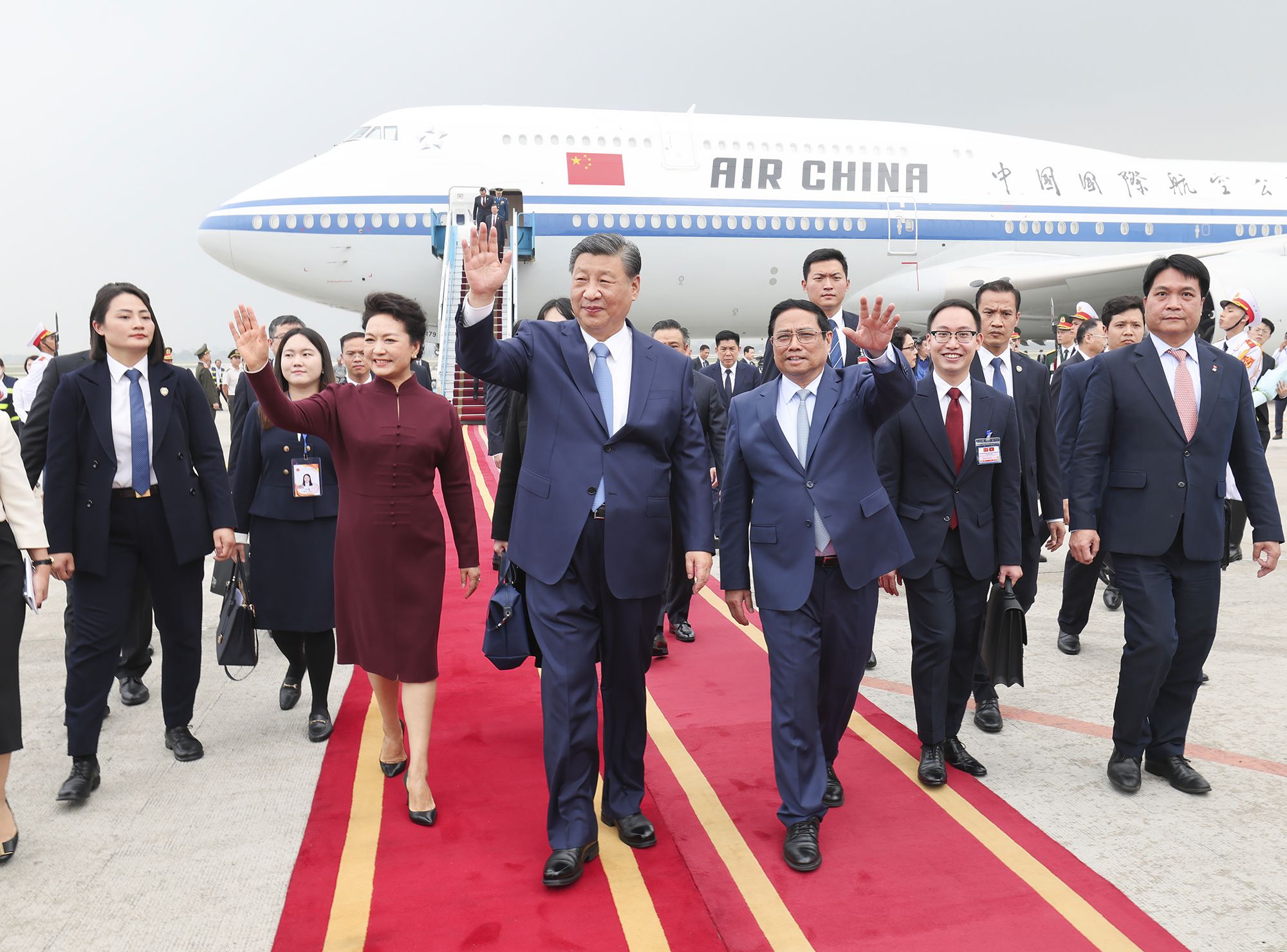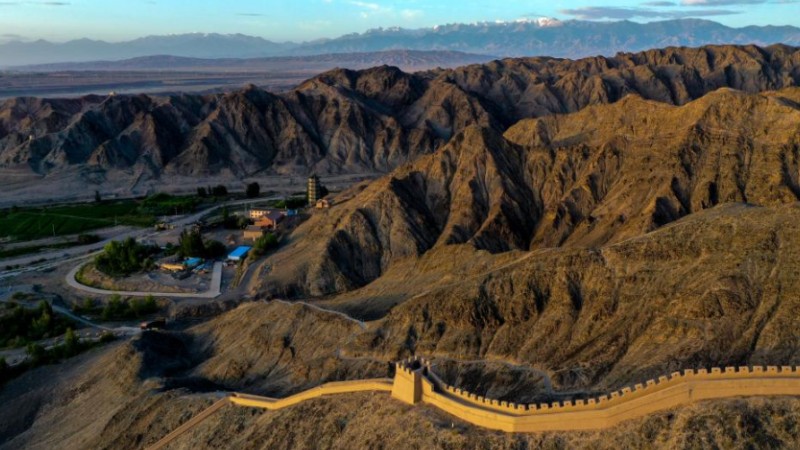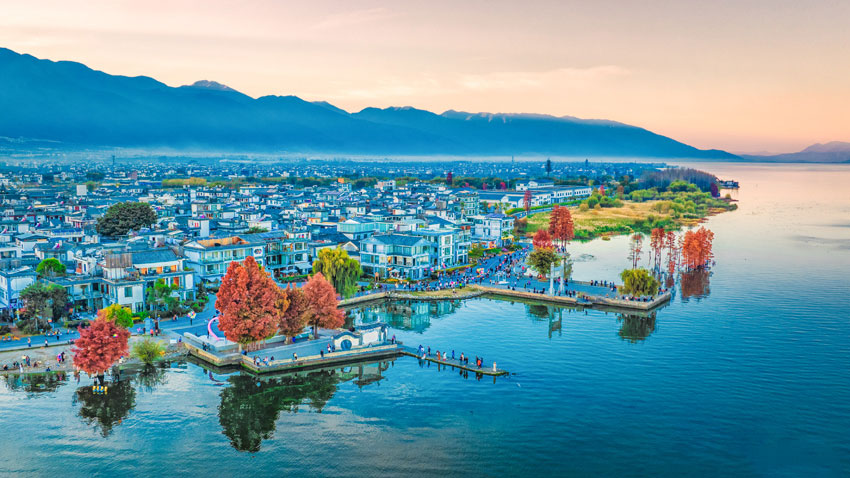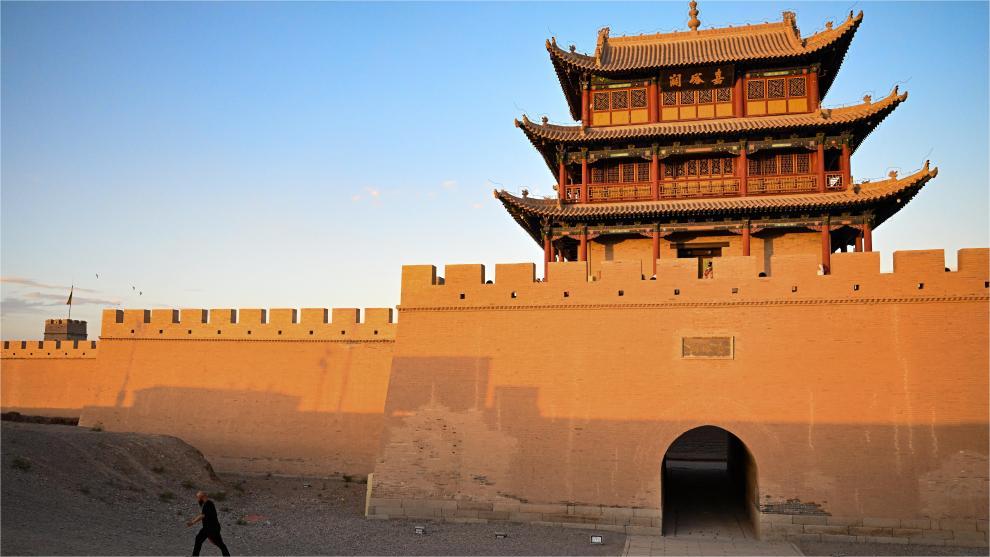Xi's Vietnam visit to bring bilateral ties into new stage

Xi Jinping, general secretary of the Communist Party of China Central Committee and Chinese president, arrives in Hanoi, capital of Vietnam on December 12, 2023, for a state visit at the invitation of General Secretary of the Central Committee of the Communist Party of Vietnam Nguyen Phu Trong and Vietnamese President Vo Van Thuong. Photo: Xinhua
China-Vietnam ties will enter a new stage of greater political mutual trust, more solid security cooperation, deeper mutually beneficial cooperation, stronger popular support, closer multilateral coordination, and better handling of differences, Xi Jinping, general secretary of the Communist Party of China Central Committee and Chinese president, said during a meeting with General Secretary of the Communist Party of Vietnam Central Committee Nguyen Phu Trong in Hanoi on Tuesday.
Analysts said Xi's first visit in six years to the Southeast Asian country will also promote the building of a China-Vietnam community with a shared future, benefiting the two peoples as well as the stability of the region.
Xi arrived in Hanoi, the capital of Vietnam, on Tuesday for a two-day state visit. While landing at Noi Bai International Airport, Xi received a red-carpet welcome as Vietnamese Prime Minister Pham Minh Chinh greeted him on the tarmac and over 400 representatives of various sectors from China and Vietnam welcomed Xi at the airport.
Nguyen Phu Trong held a welcoming ceremony for Xi at the Presidential Palace, followed by a 21-cannon salute.
On Tuesday, the main roads in Hanoi were lined with national flags of both China and Vietnam, as well as the flags of the two parties. Near the hotel where Xi is to stay, local residents, overseas Chinese and Chinese students held flags of both countries to welcome him.
A Chinese national surnamed Liu who has lived in Vietnam for 13 years told the Global Times that he was very excited about and proud of President Xi's visit. Liu expressed his gratitude for the stable development of China-Vietnam relations, which has brought opportunities to many Chinese and local people.
Vietnam welcomed and greeted Xi with the highest level of protocol that is not often shown upon leaders from other countries, which analysts said showcased the great importance Vietnam has attached to China-Vietnam relations as well as the particularity and significance of the bilateral relations.
According to media reports, Vietnamese leader Trong will also hold a farewell event to see Xi off on Wednesday.
Since last year, General Secretary of the CPV Central Committee Trong, State President of the Socialist Republic of Vietnam Vo Van Thuong and Prime Minister Chinh successively visited China and the two sides have maintained frequent and high-level exchanges, analysts said, noting that Xi's two-day state visit would push the bilateral relations to a new stage.
A community of shared future
While meeting with CPV top leader General Secretary Trong, Xi said that China always sees its ties with Vietnam from a strategic and long-term perspective and China takes its relations with Vietnam as a priority in its neighborhood diplomacy.
China, Vietnam agree to build community with shared future that carries strategic significance, Xinhua reported.
As the year 2023 marks the 15th anniversary of the China-Vietnam comprehensive strategic cooperative partnership, analysts from China and Vietnam said Xi's visit would make a prominent landmark as China and Vietnam are socialist friendly neighbors.
While the current international geopolitical situation is rapidly changing, and Southeast Asia has become the forefront of competition among major powers, building a China-Vietnam community with a shared future that carries strategic significance is not only important to China and Vietnam, two socialist countries, but will also add new impetus to regional stability, Ge Hongliang, director of the China-ASEAN Maritime Security Research Center at Guangxi University for Nationalities, told the Global Times.
As representatives of new emerging economies, China and Vietnam have a shared mission on their development and face various outside challenges, including the impact of protectionism and unilateralism of the US and the West. The China-Vietnam community with a shared future will help the two sides share more opportunities for development and add resilience to challenges, Ge said.
High anticipation
Xi's visit not only aims to consolidate and strengthen the relationship between the two countries but also echoes to timely policy adjustments by both leaders to adapt to the trends and developments in the world and the region, Nguyen Tang Nghi, vice dean in act at faculty of international relations, College of Social Sciences & Humanities, Vietnam National University of Ho Chi Minh City, told the Global Times on Tuesday.
Xi's state visit is special because it is not combined with multilateral meetings, which demonstrates the high importance that Vietnam and China attach to bilateral relations. This visit will deepen cooperation and development between the two countries in various fields such as politics and security, especially in infrastructure development and trade cooperation, according to Nghi.
China is a powerhouse in technology, digital transformation, and artificial intelligence and it is also taking a leading position in supporting industries and infrastructure. In the future, areas such as technological cooperation, artificial intelligence, and supply chains will be potential areas for deeper mutual promotion and cooperation between China and Vietnam, Nghi said.
Due to its geographical location, Vietnam's role among Southeast Asian countries is increasingly strengthening and a better China-Vietnam cooperation could also help China deeply enter the ASEAN market, said Nghi.
Nguyen Vinh Quang, vice president of the Vietnam-China Friendship Association, also expressed high expectations for future China-Vietnam cooperation.
The China-Vietnam economic and trade cooperation still has enormous potential, Quang said, noting that Vietnam's abundant agricultural and aquatic products can meet China's demands, and many Chinese goods are also popular among Vietnamese consumers.
Currently, both countries are committed to green development, utilizing clean energy, and developing the digital economy, which means they can complement each other's strengths to achieve common development.
Moreover, China and Vietnam have many similarities in their development paths, and exchanging theories and practical experiences can be a highlight of their cooperation. The Chinese-style modernization has enlightening significance and is worth referencing for Vietnam's economic and social development, said Quang.
The China-Vietnam bilateral trade continues to maintain a good development momentum and a solid foundation has been laid for broader cooperation, analysts said, noting that since 2016, Vietnam has remained China's largest trading partner within ASEAN.
The data released by the General Administration of Customs of China on Tuesday showed that the total value of imports and exports between China and Vietnam reached 1.45 trillion yuan in the first 11 months of this year, a year-on-year increase of 3.6 percent, higher than the overall growth rate of China's foreign trade during the same period.
Some Western media have also paid close attention to Xi's visit to Vietnam, as US President Joe Biden visited the Southeast Asian country in September and elevated Vietnam-US relations to a comprehensive strategic partnership level.
Vietnam prioritizes its national interests and the claim that Vietnam is joining forces with the US to confront China is completely unfounded, Nghi said.
The good and diverse relationship between Vietnam and China has been cultivated and developed by generations of leaders from both countries and Vietnam has no reason to ally with a third party to confront China, nor does it have a reason to allow other countries to use Vietnam to confront China, according to Nghi.
The prosperity and stability of the China-Vietnam relationship not only hold special significance for the two parties and their peoples but also have an impact on the security, political, and economic landscape of East Asia, said Nghi.
Photos
Related Stories
- Xi says China, Vietnam, under new circumstances, should resolutely forge ahead along path of friendly cooperation
- Xi says upgrade of China-Vietnam ties sends signal of solidarity, joint development
- Xi says China ready to work with Vietnam to promote China-Vietnam community with a shared future
- Xi says building China-Vietnam community with a shared future opens new chapter in bilateral ties
- Xi meets Vietnamese President Vo Van Thuong
- China, Vietnam elevate ties to new stage
Copyright © 2023 People's Daily Online. All Rights Reserved.









